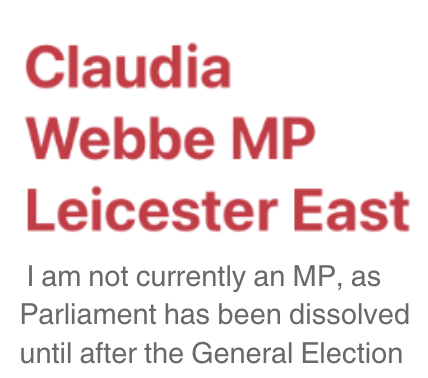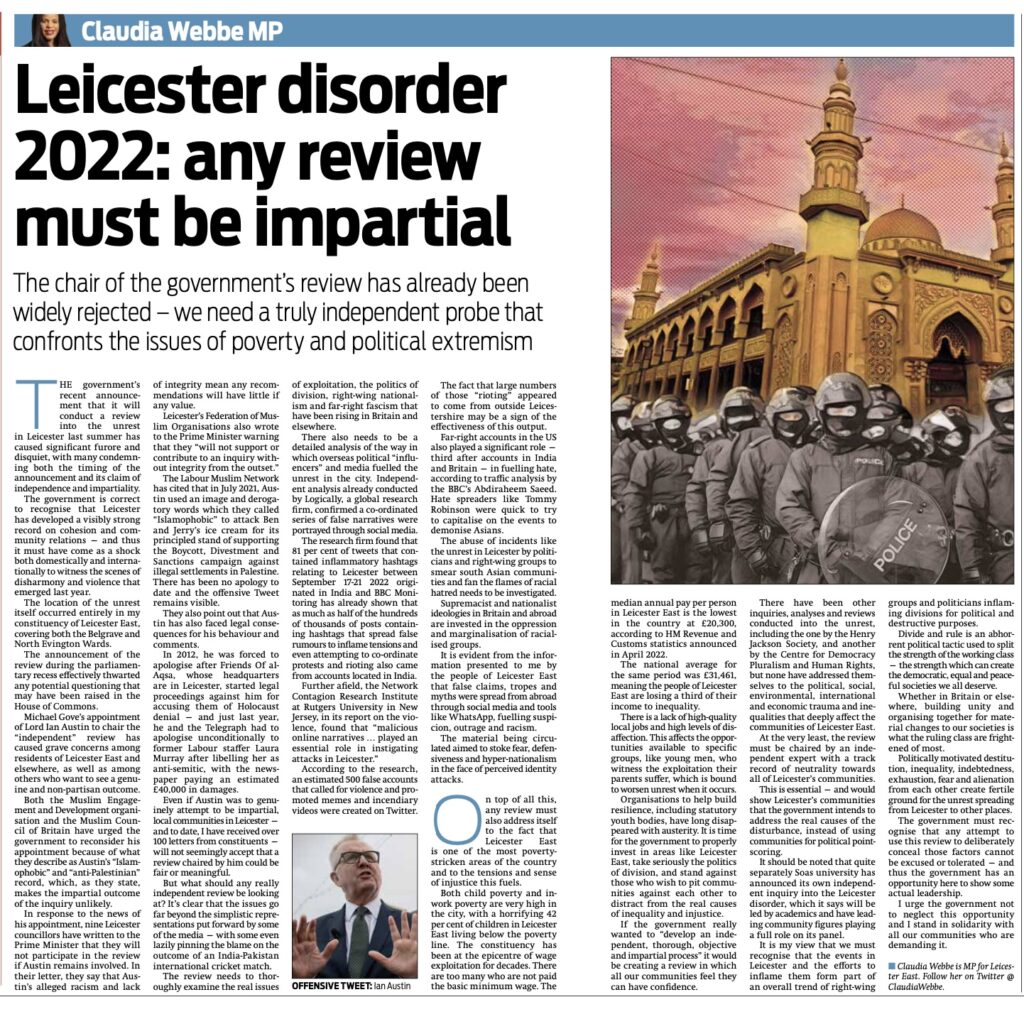Leicester Disorder 2022: any review must be impartial
By Claudia Webbe MP
The chair of the government’s review has already been widely rejected – we need a truly independent probe that confronts the issues of poverty and political extremism, writes CLAUDIA WEBBE MP.
THE government’s recent announcement that it will conduct a review into the unrest in Leicester last summer has caused significant furore and disquiet, with many condemning both the timing of the announcement and its claim of independence and impartiality.
The government is correct to recognise that Leicester has developed a visibly strong record on cohesion and community relations — and thus it must have come as a shock both domestically and internationally to witness the scenes of disharmony and violence that emerged last year.
The location of the unrest itself occurred entirely in my constituency of Leicester East, covering both the Belgrave and North Evington Wards.
The announcement of the review during the parliamentary recess effectively thwarted any potential questioning that may have been raised in the House of Commons.
Michael Gove’s appointment of Lord Ian Austin to chair the “independent” review has caused grave concerns among residents of Leicester East and elsewhere, as well as among others who want to see a genuine and non-partisan outcome.
Both the Muslim Engagement and Development organisation and the Muslim Council of Britain have urged the government to reconsider his appointment because of what they describe as Austin’s “Islamophobic” and “anti-Palestinian” record, which, as they state, makes the impartial outcome of the inquiry unlikely.
In response to the news of his appointment, nine Leicester councillors have written to the Prime Minister that they will not participate in the review if Austin remains involved. In their letter, they say that Austin’s alleged racism and lack of integrity mean any recommendations will have little if any value.
Leicester’s Federation of Muslim Organisations also wrote to the Prime Minister warning that they “will not support or contribute to an inquiry without integrity from the outset.”
The Labour Muslim Network has cited that in July 2021, Austin used an image and derogatory words which they called “Islamophobic” to attack Ben and Jerry’s ice cream for its principled stand of supporting the Boycott, Divestment and Sanctions campaign against illegal settlements in Palestine. There has been no apology to date and the offensive Tweet remains visible.
They also point out that Austin has also faced legal consequences for his behaviour and comments.
In 2012, he was forced to apologise after Friends Of al-Aqsa, whose headquarters are in Leicester, started legal proceedings against him for accusing them of Holocaust denial — and just last year, he and the Telegraph had to apologise unconditionally to former Labour staffer Laura Murray after libelling her as anti-semitic, with the newspaper paying an estimated £40,000 in damages.
Even if Austin were to genuinely attempt to be impartial, local communities in Leicester — and to date, I have received over 100 letters from constituents — will not seemingly accept that a review chaired by him could be fair or meaningful.
But what should any really independent review be looking at? It’s clear that the issues go far beyond the simplistic representations put forward by some of the media — with some even lazily pinning the blame on the outcome of an India-Pakistan international cricket match.
The review needs to thoroughly examine the real issues of exploitation, the politics of division, right-wing nationalism and far-right fascism that have been rising in Britain and elsewhere.
There also needs to be a detailed analysis of the way in which overseas political “influencers” and media fuelled the unrest in the city. Independent analysis already conducted by Logically, a global research firm, confirmed a co-ordinated series of false narratives were portrayed through social media.
The research firm found that 81 per cent of tweets that contained inflammatory hashtags relating to Leicester between September 17-21 2022 originated in India and BBC Monitoring has already shown that as much as half of the hundreds of thousands of posts containing hashtags that spread false rumours to inflame tensions and even attempting to co-ordinate protests and rioting also came from accounts located in India.
Further afield, the Network Contagion Research Institute at Rutgers University in New Jersey, in its report on the violence, found that “malicious online narratives … played an essential role in instigating attacks in Leicester.”
According to the research, an estimated 500 false accounts that called for violence and promoted memes and incendiary videos were created on Twitter.
The fact that large numbers of those “rioting” appeared to come from outside Leicestershire may be a sign of the effectiveness of this output.
Far-right accounts in the US also played a significant role — third after accounts in India and Britain — in fuelling hate, according to traffic analysis by the BBC’s Abdiraheem Saeed. Hate spreaders like Tommy Robinson were quick to try to capitalise on the events to demonise Asians.
The abuse of incidents like the unrest in Leicester by politicians and right-wing groups to smear south Asian communities and fan the flames of racial hatred needs to be investigated.
Supremacist and nationalist ideologies in Britain and abroad are invested in the oppression and marginalisation of racialised groups.
It is evident from the information presented to me by the people of Leicester East that false claims, tropes and myths were spread from abroad through social media and tools like WhatsApp, fuelling suspicion, outrage and racism.
The material being circulated aimed to stoke fear, defensiveness and hyper-nationalism in the face of perceived identity attacks.
On top of all this, any review must also address itself to the fact that Leicester East is one of the most poverty-stricken areas of the country and to the tensions and sense of injustice this fuels.
Both child poverty and in-work poverty are very high in the city, with a horrifying 42 per cent of children in Leicester East living below the poverty line. The constituency has been at the epicentre of wage exploitation for decades.
There are too many who are not paid the basic minimum wage. The median annual pay per person in Leicester East is the lowest in the country at £20,300, according to HM Revenue and Customs statistics announced in April 2022.
The national average for the same period was £31,461, meaning the people of Leicester East are losing a third of their income to inequality.
There is a lack of high-quality local jobs and high levels of disaffection. This affects the opportunities available to specific groups, like young men, who witness the exploitation their parents suffer, which is bound to worsen unrest when it occurs.
Organisations to help build resilience, including statutory youth bodies, have long disappeared with austerity. It is time for the government to properly invest in areas like Leicester East, take seriously the politics of division, and stand against those who wish to pit communities against each other to distract from the real causes of inequality and injustice.
If the government really wanted to “develop an independent, thorough, objective and impartial process” it would be creating a review in which all our communities feel they can have confidence.
There have been other inquiries, analyses and reviews conducted into the unrest, including the one by the Henry Jackson Society, and another by the Centre for Democracy Pluralism and Human Rights, but none have addressed themselves to the political, social, environmental, international and economic trauma and inequalities that deeply affect the communities of Leicester East.
At the very least, the review must be chaired by an independent expert with a track record of neutrality towards all of Leicester’s communities.
This is essential — and would show Leicester’s communities that the government intends to address the real causes of the disturbance, instead of using communities for political point-scoring.
It should be noted that quite separately Soas university has announced its own independent inquiry into the Leicester disorder, which it says will be led by academics and have leading community figures playing a full role on its panel.
It is my view that we must recognise that the events in Leicester and the efforts to inflame them form part of an overall trend of right-wing groups and politicians inflaming divisions for political and destructive purposes.
Divide and rule is an abhorrent political tactic used to split the strength of the working class — the strength which can create the democratic, equal and peaceful societies we all deserve.
Whether in Britain or elsewhere, building unity and organising together for material changes to our societies is what the ruling class are frightened of most.
Politically motivated destitution, inequality, indebtedness, exhaustion, fear and alienation from each other create fertile ground for the unrest spreading from Leicester to other places.
The government must recognise that any attempt to use this review to deliberately conceal those factors cannot be excused or tolerated — and thus the government has an opportunity here to show some actual leadership.
I urge the government not to neglect this opportunity and I stand in solidarity with all our communities who are demanding it.
Claudia Webbe MP is the member of Parliament for Leicester East. You can follow her at www.facebook.com/claudiaforLE and twitter.com/ClaudiaWebbe



